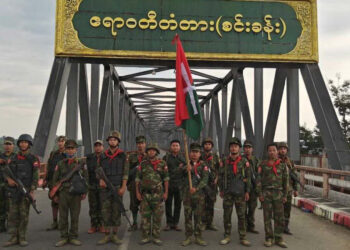RANGOON — Burma’s opposition leader Aung San Suu Kyi has warned armed ethnic minority groups not to rush into signing a nationwide ceasefire, a top party colleague said Wednesday, a position that pits her against President Thein Sein, who has made reaching a deal before November elections his top priority.
Talks between more than a dozen rebel groups and the government have been held on and off again for more than 18 months.
Win Htein, an executive of the opposition National League for Democracy (NLD), said party leader Suu Kyi expressed her opinion at a Saturday meeting with Maj. Htoo Htoo Lay of the Karen National Union (KNU), which has announced it is ready to sign. The KNU is one of the bigger ethnic minority groups that have been fighting the central government for decades to win greater autonomy.
“Suu Kyi said ethnic groups will have to consider not signing the nationwide ceasefire agreement before the Nov. 8 general election,” he said. “It has to be meaningful.”
Suu Kyi has so far stayed largely silent on the issue. But with elections around the corner and her party widely expected to win a majority of the seats, she has begun speaking out more on some issues. Ethnic unrest was long used as an excuse for the army to exercise control over the country’s administration, and is a very sensitive issue because it relates to the country’s unity.
Some of the larger ethnic parties are loosely allied with her party, sharing the perception that the military-backed ruling Union Solidarity and Development Party (USDP) is their antagonist. It is unlikely, however, that she would have much influence over their positions, unless they believe her party can take power and offer a better deal. The military, however, has veto power over any constitutional amendments, limiting any major changes her party might try to make.
While the government has been saying for more than a year that a ceasefire agreement is imminent, fighting continues with several groups, and it has refused so far to accept several demands from the rebel groups. The latest stumbling block is the government’s decision to exclude the Shan State’s Ta’ang National Liberation Army (TNLA), the Kokang group and the Arakan Army from the pact because they are not among the 15 officially recognized rebel armies.
Ethnic armed groups and government representatives have signed a number of ceasefire agreements since independence from colonial rule in quest of peace, but the deals have usually fallen apart.
Martyred independence hero Gen. Aung San—Suu Kyi’s father—in 1947 signed the Panglong Agreement, which was supposed to serve as a model for allowing autonomy for ethnic minority groups, but was ultimately neglected.

















